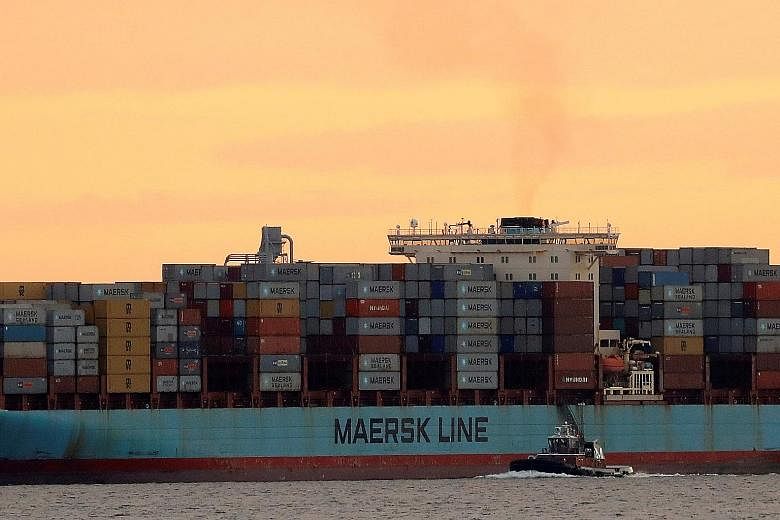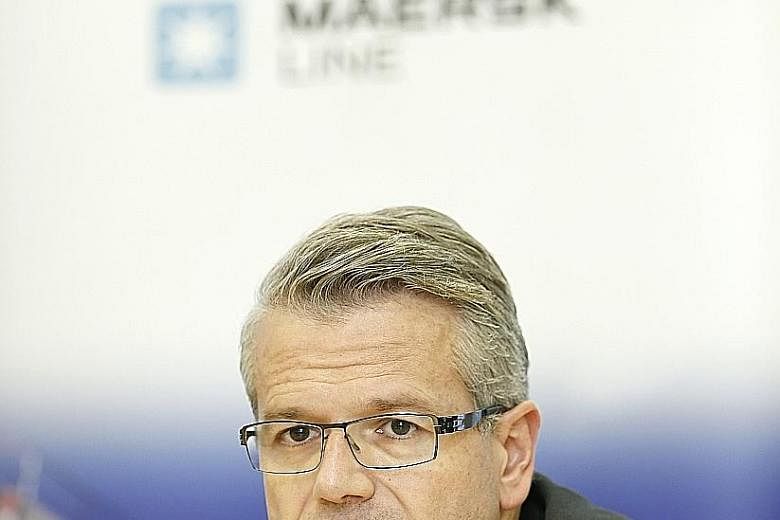Maersk Line's €3.7 billion (S$5.9 billion) acquisition of Hamburg Sud is propelling the container shipping giant - already the world's No. 1 carrier - further ahead of its competitors in the relentless race for market share.
And for Singapore, a bigger Maersk would only mean higher box volumes here, said the company's chief commercial officer Vincent Clerc.
"Our strategy is to move away from being a conglomerate present in different industries to being a company focused on transportation and logistics," Mr Clerc told The Business Times yesterday. "With the acquisition of Hamburg Sud, we are really cementing our leadership position in container transportation, and we are building our presence in key markets like Latin America and Oceania, where Hamburg Sud has historically been strong."
Maersk is the largest container shipping line worldwide with 646 vessels, while Hamburg Sud is the seventh largest with 116 ships.
Together, they now hold an 18 per cent share of global capacity - up from Maersk's 15 per cent share before the acquisition - comprising 762 container vessels with a combined container capacity of about four million twenty-foot equivalent units (TEUs). Maersk expects to reap operational cost savings of US$350 million (S$472 million) to US$400 million annually for the first few years, starting in 2019.
With the acquisition, Maersk will move to reflag most of Hamburg Sud's vessels to either Denmark or Singapore. Maersk has investments in Singapore totalling over US$12 billion, including 46 vessels and rigs under the Singapore flag. "For a long time, we've built very deep relationships in Singapore, we've had a lot of activities here - it's a place that makes sense for us," said Mr Clerc.
"And as we integrate Hamburg Sud and continue to grow as a company, Singapore will benefit with an increase in numbers for the transshipment moves happening here," he added. All of Hamburg Sud's transshipment activities for South-east Asia will remain in Singapore, unchanged.
-
762
Total number of container vessels Maersk and Hamburg Sud have, or 18 per cent of global capacity.
Maersk's share of transshipment volumes through Singapore has grown significantly in recent years, even as the shipping line continues to use its dedicated berths at Malaysia's Port of Tanjung Pelepas.
The Port of Singapore handled about 4.5 million TEUs of Maersk Line containers last year - up 69 per cent from the 2.7 million TEUs seen in 2013. "Singapore has traditionally been one of the real pivot areas for trade and shipping, and South-east Asia is the area in Asia that is seeing the strongest growth right now. Obviously, Singapore is the natural transshipment hub for South-east Asia," noted Mr Clerc.
That said, Maersk's acquisition of Hamburg Sud, on its own, will have only "a minor impact" on box traffic coming through Singapore, given that the German firm is a relatively small carrier in South-east Asia, said Mr Tan Hua Joo, executive consultant of Alphaliner.
Elaborating on the buyout, Mr Clerc said Maersk has chosen a "light-touch integration" approach, where it will maintain and run Hamburg Sud as a separate commercial entity. "We think we can build on this brand by maintaining what makes Hamburg Sud different and preserving it," he said.



